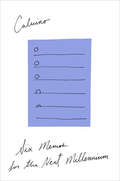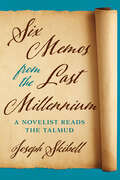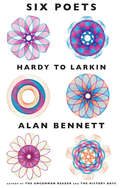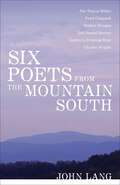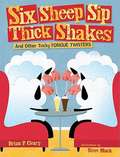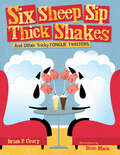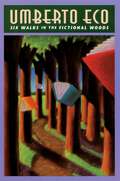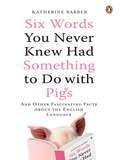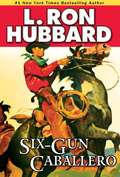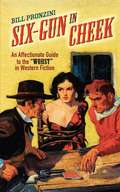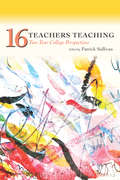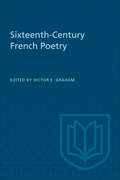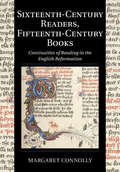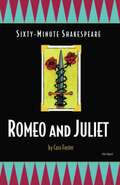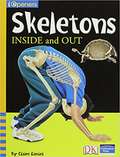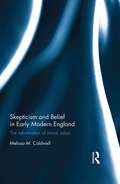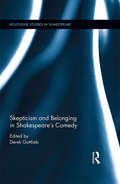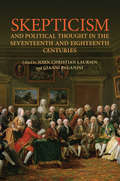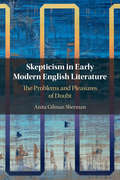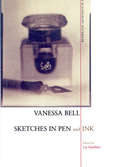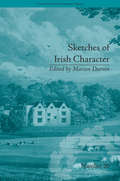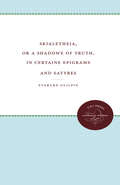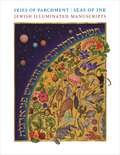- Table View
- List View
Six Memos for the Next Millennium (The\charles Eliot Norton Lectures #391)
by Italo CalvinoThe celebrated author of Cosmicomics and Invisible Cities shares his &“brilliant, original approach to literature&” in these late-career lectures (San Francisco Chronicle). At the time of his death, Italo Calvino was at work on his Charles Eliot Norton poetry lectures to be delivered the following year at Harvard University. The six planned lectures would define the qualities he most valued in writing, and which he believed would define literature in the century to come. Six Memos for the Next Millennium collects the five lectures he completed, forming not only a stirring defense of literature, but also an indispensable guide to the writings of Calvino himself. He devotes one &“memo&” each to the concepts of lightness, quickness, exactitude, visibility, and multiplicity, drawing examples from his vast knowledge of myth, folklore, and works both ancient and modern. Written in the mid-1980s, these lectures have proven to be astonishingly prescient as we have entered Calvino&’s &“next millennium&”. &“One of the most rigorously presented and beautifully illustrated critical testaments in all of literature.&”—Boston Globe &“A key to Calvino&’s own work and a thoroughly delightful and illuminating commentary on some of the world&’s greatest writing.&”—San Francisco Chronicle
Six Memos from the Last Millennium: A Novelist Reads the Talmud (Exploring Jewish Arts and Culture)
by Joseph SkibellA storyteller&’s take on the Talmud and the timeless wisdom contained within its tales provides &“a fresh look at an ancient source&” (Kirkus Reviews). A thief-turned-saint, killed by an insult. A rabbi burning down his world in order to save it. A man who lost his sanity while trying to fathom the origin of the universe. A beautiful woman battling her brother&’s and her husband&’s egos to preserve their family. Stories such as these enliven the pages of the Talmud, the great repository of ancient wisdom that is one of the sacred texts of the Jewish people. Comprised of the Mishnah, the oral law of the Torah, and the Gemara, a multigenerational metacommentary on the Mishnah dating from between 3950 and 4235 (190 and 475 CE), the Talmud presents a formidable challenge to understand without scholarly training and study. But what if one approaches it as a collection of tales with surprising relevance for contemporary readers? In Six Memos from the Last Millennium, Joseph Skibell, critically acclaimed author of A Blessing on the Moon and other novels, reads some of the Talmud&’s tales with a storyteller&’s insight, concentrating on the lives of the legendary rabbis depicted in its pages to uncover the wisdom they can still impart to our modern age. He unifies strands of stories that are scattered throughout the Talmud into coherent narratives or &“memos,&” which he then analyzes and interprets from his perspective as a novelist. In Skibell&’s imaginative and personal readings, this sacred literature frequently defies our conventional notions of piety. Sometimes wild, rude, and even bawdy, these memos from the last millennium pursue a livable transcendence, a way of fusing the mundane hours of earthly life with a cosmic sense of holiness and wonder.
Six Minutes a Day to Perfect Spelling
by Harry ShefterPeople make spelling mistakes simply because they have never formed the right spelling habits. Here is a proven method that will make you a master speller.
Six Poets
by Alan BennettThe inimitable Alan Bennett selects and comments upon six favorite poets and the pleasures of their works In this candid, thoroughly engaging book, Alan Bennett creates a unique anthology of works by six well-loved poets. Freely admitting his own youthful bafflement with poetry, Bennett reassures us that the poets and poems in this volume are not only accessible but also highly enjoyable. He then proceeds to prove irresistibly that this is so. Bennett selects more than seventy poems by Thomas Hardy, A. E. Housman, John Betjeman, W. H. Auden, Louis MacNeice, and Philip Larkin. He peppers his discussion of these writers and their verse with anecdotes, shrewd appraisal, and telling biographical detail: Hardy lyrically recalls his first wife, Emma, in his poetry, although he treated her shabbily in real life. The fabled Auden was a formidable and off-putting figure at the lectern. Larkin, hoping to subvert snooping biographers, ordered personal papers shredded upon his death. Simultaneously profound and entertaining, Bennett's book is a paean to poetry and its creators, made all the more enjoyable for being told in his own particular voice. its creators, made all the more enjoyable for being told in his own particular voice.
Six Poets from the Mountain South: Sherman's Troops in the Savannah and Carolinas Campaigns (Southern Literary Studies)
by John LangIn the most extensive work to date on major poets from the mountain South, John Lang takes as his point of departure an oft-quoted remark by Jim Wayne Miller: "Appalachian literature is -- and has always been -- as decidedly worldly, secular, and profane in its outlook as the [region's] traditional religion appears to be spiritual and otherworldly." Although this statement may be accurate for Miller's own poetry and fiction, Lang maintains that it does not do justice to the pervasive religious and spiritual concerns of many of the mountain South's finest writers, including the five other leading poets whose work he analyzes along with Miller's. Fred Chappell, Robert Morgan, Jeff Daniel Marion, Kathryn Stripling Byer, and Charles Wright, Lang demonstrates, all write poetry that explores, sometimes with widely varying results, what they see as the undeniable presence of the divine within the temporal world. Like Blake and Emerson before them, these poets find the supernatural within nature rather than beyond it. They all exhibit a love of place in their poems, a strong sense of connection to nature and the land, especially the mountains. Yet while their affirmation of the world before them suggests a resistance to the otherworldliness that Miller points to, their poetry is nonetheless permeated with spiritual questing. Dante strongly influences both Chappell and Wright, though the latter eventually resigns himself to being simply "a God-fearing agnostic," whereas Chappell follows Dante in celebrating "the love that moves the sun and other stars." Byer, probably the least orthodox of these poets, chooses to lay up treasures on earth, rejecting the transcendent in favor of a Native American spirituality of immanence, while Morgan and Marion find in nature what Marion calls a "vocabulary of wonders" akin to Emerson's conviction that nature is the language of the spiritual. Employing close readings of the poets' work and relating it to British and American Romanticism as well as contemporary eco-theology and eco-criticism, Lang's book is the most ambitious and searching foray yet into the worlds of these renowned post--World War II Appalachian poets.
Six Sheep Sip Thick Shakes: And Other Tricky Tongue Twisters
by Brian P. ClearyBrian P Cleary, author of the best-selling Words Are CATegorical series, displays his wacky wordplay in this fun book of tongue twisters. His silly sentences are sure to have you giggling, groaning, and guffawing. Playful art by Steve Mack adds to the fun. Plus, you'll find tips for creating your own tongue twisters! Test your tongue on these tricky twisters and see if it gets tied up in knots.
Six Sheep Sip Thick Shakes: And Other Tricky Tongue Twisters (Exceptional Reading And Language Arts Titles For Intermediate Grades Ser.)
by Steve Mack Brian P ClearyFrom best-selling author Brian P. Cleary, Six Sheep Sip Thick Shakes is a real mouthful! Presenting readers with twenty-four challenging and hilarious tongue twisters, Cleary's inventive sentences and Steve Mack's appealing art will leave readers tongue-tied?and laughing through their teeth.
Six Walks in the Fictional Woods
by Umberto EcoIn this exhilarating book, we accompany Umberto Eco as he explores the intricacies of fictional form and method. Using examples ranging from fairy tales and Flaubert, Poe and Mickey Spillane, Eco draws us in by means of a novelist's techniques, making us his collaborators in the creation of his text and in the investigation of some of fiction's most basic mechanisms.
Six Words You Never Knew Had Something To Do With Pigs: And Other Fascinating Facts About The English Language
by Katherine BarberA delightfully addictive compendium of fascinating word facts that does for the dictionary what Eats, Shoots, and Leaves did for the manual of style. <P> With the easy erudition and lively wit that have won her legions of fans, Canada's "Word Lady" reveals the entertaining histories behind 500 of the most common words and phrases in the English language. Who knew that 'travel' is derived from an instrument of torture? That "tragedy" originally had something to do with goats? That "glamour" and "grammar" started out as the same word? <P> Katherine Barber's captivating collection is organized by season, so readers can open to Valentine's Day to learn about the origins of "passion fruit" or flip to Thanksgiving to find out why there aren't any turkeys in Turkey. An irresistible blend of entertainment and enlightenment, this delightful book will captivate the word lover in all of us.
Six-Gun Caballero
by L. Ron HubbardSaddle up for this adventure. Michael Patrick Obanon, proud owner of a 100,000-acre spread willed to him by his father, suddenly loses his entire inheritance when a band of criminals makes false claims on the ranch. Faced with having to save his property and his people, Obanon takes a courageous stand against the renegades.Yet he soon realizes it will take far more than mere weapons to win the day. With all guns seemingly drawn against him, Michael must come up with a devious strategy of his own to outwit the imposters and regain his birthright. "If proof were needed that L. Ron Hubbard could handle the Western with the flair of a Louis L'Amour or Zane Grey, this book is it." --True West Magazine
Six-Gun in Cheek: An Affectionate Guide to the "Worst" in Western Fiction
by Bill PronziniThis hilarious and informative study of "alternative Westerns" takes aim at sub-par cowboy fiction. Author Bill Pronzini presents hundreds of laughable one-liners and juicy excerpts of deliciously awful dialogue from pulp magazines of the 1920s and '30s as well as paperbacks of the '50s, '60s, and '70s. Pronzini also offers plot summaries, anecdotes, historical tidbits, and little-known facts about writers from the heyday of the horse opera. Discover the meaning of slang terms such as "slicker 'n slobbers" and "doogin pin" and marvel at a plot element "so bold, so dazzling, so casually insane" that it elevates Jackson Cole's Black Gold to the greatest of all alternative classic Western novels. Meet Chuck Martin, the writer who solemnly "buried" the characters he killed off in his stories in a private cemetery in his backyard, and get acquainted with a gallery of memorable fictional characters, including Ridin' Rand of the Rio Grande, the world's first rhinestone cowboy. The author of Gun in Cheek, a similarly affectionate send-up of crime fiction, Pronzini provides a comic survey that will delight all fans of popular Western fiction.
Sixteen Modern American Authors: A Survey of Research and Criticism since 1972
by Jackson R. BryerPraise for the earlier edition:"Students of modern American literature have for some years turned to Fifteen Modern American Authors (1969) as an indispensable guide to significant scholarship and criticism about twentieth-century American writers. In its new form--Sixteenth Modern American Authors--it will continue to be indispensable. If it is not a desk-book for all Americanists, it is a book to be kept in the forefront of the bibliographical compartment of their brains."--American Studies
Sixteen Teachers Teaching: Two-Year College Perspectives
by Patrick SullivanSixteen Teachers Teaching is a warmly personal, full-access tour into the classrooms and teaching practices of sixteen distinguished two-year college English professors. Approximately half of all basic writing and first-year composition classes are now taught at two-year colleges, so the perspectives of English faculty who teach at these institutions are particularly valuable for our profession. This book shows us how a group of acclaimed teachers put together their classes, design reading and writing assignments, and theorize their work as writing instructors. All of these teachers have spent their careers teaching multiple sections of writing classes each semester or term, so this book presents readers with an impressive—and perhaps unprecedented—abundance of pedagogical expertise, teaching knowledge, and classroom experience. Sixteen Teachers Teaching is a book filled with joyfulness, wisdom, and pragmatic advice. It has been designed to be a source of inspiration for high school and college English teachers as they go about their daily work in the classroom. Contributors: Peter Adams, Jeff Andelora, Helane Adams Androne, Taiyon J. Coleman, Renee DeLong, Kathleen Sheerin DeVore, Jamey Gallagher, Shannon Gibney, Joanne Baird Giordano, Brett Griffiths, Holly Hassel, Darin Jensen, Jeff Klausman, Michael C. Kuhne, Hope Parisi, and Howard Tinberg
Sixteenth-Century French Poetry
by Victor E GrahamIn this anthology an effort has been made to include representative selections from the most significant sixteenth-century French poets. With the exception if a few longer works (mainly those of Ronsard, Du Bartas, and D'Aubigné), poems are given complete. In addition, the original spelling and punctuation have been retained as far as possible, except for the usual editorial modifications (differentiation of u and v, i and j, the addition of accents à, où, replacement of & by et, and so on). The sixteenth century is a period of tremendous poetic activity. It is a period closer in spirit to us in many ways than the intervening centuries, particularly the seventeenth and the eighteenth. Its poetry is still being rediscovered and re-assessed in a way that is just as exciting as the period of foment during which it was written.
Sixteenth-Century Readers, Fifteenth-Century Books: Continuities of Reading in the English Reformation (Cambridge Studies in Palaeography and Codicology)
by Margaret ConnollyThis innovative study investigates the reception of medieval manuscripts over a long century, 1470–1585, spanning the reigns of Edward IV to Elizabeth I. Members of the Tudor gentry family who owned these manuscripts had properties in Willesden and professional affiliations in London. These men marked the leaves of their books with signs of use, allowing their engagement with the texts contained there to be reconstructed. Through detailed research Margaret Connolly reveals the various uses of these old books: as a repository for family records; as a place to preserve other texts of a favourite or important nature; as a source of practical information for the household; and as a professional manual for the practising lawyer. Investigation of these family owned books reveals an unexpectedly strong interest in works of the past and the continuing intellectual and domestic importance of medieval manuscripts in an age of print.
Sixty-minute Shakespeare: Romeo And Juliet
by William Shakespeare Cass FosterThe introduction to SHAKESPEARE is not an easy task. Sometimes the magic can use a little assistance! To make the works of Shakespeare accessible to all ages and levels of education, Cass Foster combines his experience as a professor emeritus of theatre, fight choreographer, and stage director to provide the Sixty-Minute Shakespeare series. Foster’s renditions of the timeless tales are not adaptations or modernizations, but rather judiciously condensed versions of the Bard's classics.
Skeletons Inside and Out
by Claire DanielComplete Classroom Library includes one each of the following: Math Library Science Library Social Studies Library Content Area Classroom Libraries include: 1 display box containing 10 6-packs (60 little books) 1 Teacher Resource Portfolio 1 Assessment Book (where available) Classroom Library Add-on Packs include 1 copy of each title from the social studies, science, and math libraries. Add-On Packs include 1 copy of each title.
Skepticism and Belief in Early Modern England: The Reformation of Moral Value
by Melissa M. CaldwellThe central thesis of this book is that skepticism was instrumental to the defense of orthodox religion and the development of the identity of the Church of England. Examining the presence of skepticism in non-fiction prose literature at four transitional moments in English Protestant history during which orthodoxy was challenged and revised, Melissa Caldwell argues that a skeptical mode of thinking is embedded in the literary and rhetorical choices made by English writers who straddle the project of reform and the maintenance of orthodoxy after the Reformation in England. Far from being a radical belief simply indicative of an emerging secularism, she demonstrates the varied and complex appropriations of skeptical thought in early modern England. By examining a selection of various kinds of literature-including religious polemic, dialogue, pamphlets, sermons, and treatises-produced at key moments in early modern England’s religious history, Caldwell shows how the writers under consideration capitalized on the unscripted moral space that emerged in the wake of the Reformation. The result was a new kind of discourse--and a new form of orthodoxy--that sought both to exploit and to contain the skepticism unearthed by the Reformation.
Skepticism and Belonging in Shakespeare's Comedy (Routledge Studies in Shakespeare)
by Derek GottliebThis book recovers a sense of the high stakes of Shakespearean comedy, arguing that the comedies, no less than the tragedies, serve to dramatize responses to the condition of being human, responses that invite scholarly investigation and explanation. Taking its cue from Stanley Cavell’s influential readings of Othello and Lear, the book argues that exposure or vulnerability to others is the source of both human happiness and human misery; while the tragedies showcase attempts at the evasion of such vulnerability through the self-defeating pursuit of epistemological certainty, the comedies present the drama and the difficulty of turning away from an epistemological register in order to productively respond to the fact of our humanity. Where Shakespeare’s tragedies might be viewed in Cavellian terms as the drama of skepticism, Shakespeare’s comedies then exemplify the drama of acknowledgement. As a parallel and a preamble, Gottlieb suggests that the field of literary studies is itself a site of such revealing responses: where competing research methods strive to foreclose upon (or, alternatively, rejoice in) epistemological uncertainty, such commitments bespeak an urge to avoid or circumvent the human in the practice of scholarship. Reading Shakespeare’s comedies in tandem with a "defactoist" view of teaching and learning points in the direction of a new humanism, one that eschews both the relativism of old deconstruction and contemporary Presentism and the determinism of various kinds of structural accounts. This book offers something new in scholarly and popular understanding of Shakespeare’s work, doing so with both philosophical rigor and literary attention to the difficult work of reading.
Skepticism and Political Thought in the Seventeenth and Eighteenth Centuries
by Gianni Paganini John Christian LaursenIn this collection, thirteen distinguished contributors examine the influence of the ancient skeptical philosophy of Pyrrho of Elis and Sextus Empiricus on early modern political thought. Classical skepticism argues that in the absence of certainty one must either suspend judgment and live by habit or act on the basis of probability rather than certainty. In either case, one must reject dogmatic confidence in politics and philosophy.Surveying the use of skepticism in works by Hobbes, Descartes, Hume, Smith, and Kant, among others, the essays in Skepticism and Political Thought in the Seventeenth and Eighteenth Centuries demonstrate the pervasive impact of skepticism on the intellectual landscape of early modern Europe. This volume is not just an authoritative account of skepticism's importance from the Enlightenment to the French Revolution, it is also the basis for understanding skepticism's continuing political implications.
Skepticism in Early Modern English Literature: The Problems and Pleasures of Doubt
by Anita Gilman ShermanThis ambitious account of skepticism's effects on major authors of England's Golden Age shows how key philosophical problems inspired literary innovations in poetry and prose. When figures like Spenser, Shakespeare, Donne, Herbert of Cherbury, Cavendish, Marvell and Milton question theories of language, degrees of knowledge and belief, and dwell on the uncertainties of perception, they forever change English literature, ushering it into a secular mode. While tracing a narrative arc from medieval nominalism to late seventeenth-century taste, the book explores the aesthetic pleasures and political quandaries induced by skeptical doubt. It also incorporates modern philosophical views of skepticism: those of Stanley Cavell, Ludwig Wittgenstein, Roland Barthes, and Hans Blumenberg, among others. The book thus contributes to interdisciplinary studies of philosophy and literature as well as to current debates about skepticism as a secularizing force, fostering civil liberties and religious freedoms.
Sketches In Pen And Ink: A Bloomsbury Notebook
by Vanessa BellVanessa Bell, artist, sister of Virginia Woolf, wife of Clive Bell and lover of Duncan Grant, is one of the most fascinating and modern figures of the Bloomsbury set, but unlike most of them she rarely put pen to writing paper. When she did, she was witty and illuminating about their early lives. The eldest of the Stephen family, she grew up with Virginia in Victorian gloom at Hyde Park Gate and later blossomed in bohemian style in Bloomsbury. From the twenties to the forties she lived and painted at Charleston Farmhouse like a heroine of the sixties and seventies, at the centre of a colourful world of family, friends, artists and intellectuals. Sketches in Pen and Ink is a unique collection of largely unpublished memoirs - most of them written to be read at meetings of the Memoir club, in which Vanessa writes with wit and charm about herself, her childhood, her remarkable family and friends, her moving relationship with Roger Fry, and her art. Her daughter, Angelica Garnett, has written a vivid and personal introduction which adds considerably to our understanding of this extraordinary woman and artist.
Sketches of Irish Character: by Mrs S C Hall (Chawton House Library: Women's Novels #20)
by Marion DurninBorn in Dublin into the Anglo-Irish gentry, Anna Maria Hall moved to London when she was fifteen where she became famous for her books, plays and travel writing. It was her book, Sketches of Irish Character (1829) which made her a household name. This modern critical edition is based on Hall's third, revised edition of 1844.
Skialetheia, or A Shadowe of Truth, in Certaine Epigrams and Satyres
by Everard GuilpinAlthough well known to experts in English literature, Guilpin's Skialetheia has been available only in inadequate texts until now. This edition of the 1598 work presents an old-spelling critical text and provides and introduction and commentary on the text. These seventy epigrams and seven formal verse satires display the peculiarly negative, malicious tone associated with English literature of the time.Originally published 1974.A UNC Press Enduring Edition -- UNC Press Enduring Editions use the latest in digital technology to make available again books from our distinguished backlist that were previously out of print. These editions are published unaltered from the original, and are presented in affordable paperback formats, bringing readers both historical and cultural value.
Skies of Parchment, Seas of Ink: Jewish Illuminated Manuscripts
by Raymond P. Scheindlin Eva Frojmovic Diane Wolfthal Jenna Siman Jacobs Hartley Lachter Shalom Sabar Ágnes Vető Susan Vick Barbara WolffA superbly illustrated history of five centuries of Jewish manuscriptsThe love of books in the Jewish tradition extends back over many centuries, and the ways of interpreting those books are as myriad as the traditions themselves. Skies of Parchment, Seas of Ink offers the first full survey of Jewish illuminated manuscripts, ranging from their origins in the Middle Ages to the present day. Featuring some of the most beautiful examples of Jewish art of all time—including hand-illustrated versions of the Bible, the Haggadah, the prayer book, marriage documents, and other beloved Jewish texts—the book introduces readers to the history of these manuscripts and their interpretation.Edited by Marc Michael Epstein with contributions from leading experts, this sumptuous volume features a lively and informative text, showing how Jewish aesthetic tastes and iconography overlapped with and diverged from those of Christianity, Islam, and other traditions. Featured manuscripts were commissioned by Jews and produced by Jews and non-Jews over many centuries, and represent Eastern and Western perspectives and the views of both pietistic and liberal communities across the Diaspora, including Europe, Israel, the Middle East, and Africa.Magnificently illustrated with pages from hundreds of manuscripts, many previously unpublished or rarely seen, Skies of Parchment, Seas of Ink offers surprising new perspectives on Jewish life, presenting the books of the People of the Book as never before.
